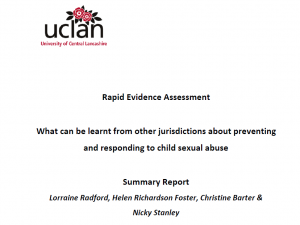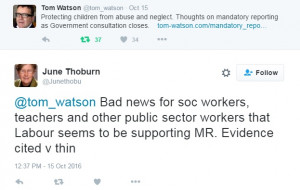Preventing and responding to Child Sexual Abuse: Learning about best practice from overseas (Lorraine Radford et al., 2017)
At the outset it is worth reminding ourselves of the reason the Independent Inquiry Into Child Sexual Abuse was established.
- To consider the extent to which State and non-State institutions have failed in their duty of care to protect children from sexual abuse and exploitation;
- To consider the extent to which those failings have since been addressed;
- To identify further action needed to address any failings identified;
- To consider the steps which it is necessary for State and non-State institutions to take in order to protect children from such abuse in future; and
- To publish a report with recommendations.
We believe the seminar participants listed below were chosen by IICSA because of their engagement with relevant institutions:
- David Ashcroft – Chair of Association of Independent Chairs of Local Safeguarding Children Boards
- David Beard – Head of Corporate Safeguarding Barnardo’s
- Sheila Taylor MBE – Chief Executive, National Working Group (NWG)
- Professor Anthony Beech – University of Birmingham
- Pam Miller – Senior Analyst, NSPCC
- Dr Jon Bird Survivor – Support Manager, National Association of People Abused in Childhood (NAPAC)
- Susie Hargreaves OBE – Chief Executive, Internet Watch Foundation
- Namita Prakash – Service Manager, The Survivors Trust
- Lee Eggleston OBE – Operations Manager & Trustee Board Member, Rape Crisis
- Linda Dominguez – Director, One in Four
The start of the seminar was about the ‘Rapid Evidence Assessment’ – What can be learnt from other jurisdictions about preventing and responding to child sexual abuse – commissioned by IICSA from the University of Central Lancashire through a tendering process. Child protection in institutional settings was not specifically part of the review which is very unfortunate.

Disclaimer: This is a Rapid Evidence Assessment prepared at IICSA’s request. The views expressed in this report are those of the authors alone.
UCLAN’s assessment was delivered by Professor Lorraine Radford and understandably contained views of the authors’ (see disclaimer in caption) on a number of issues including mandatory reporting. We were concerned about elements of Professor Radford’s report particularly about its handling of the evidence of research on mandatory reporting led by Professor Ben Mathews of Queensland University of Technology. We wrote to Professor Jay to say so:
Our first letter to Professor Jay 19.4.17
As you see we sent a copy to Professor Radford who replied to IICSA and kindly sent us a copy:
Response from Professor Radford 25.4.17
(The letter starts ‘Dear Stephen’ who we believe may be Stephen Webster, Head of Research – IICSA)
The reply was discouraging. Professor Radford’s letter seems to suggest that despite the findings of Mathews et al., there is no concrete evidence about the actual positive outcomes to the child after the report, even if it is substantiated.
We felt the need to write once more, not least because there are a significant number of social workers on IICSA’s personnel roster, including the Chair. The profession dislikes mandatory reporting as clearly demonstrated during the 9th BASPCAN conference 2015 in Edinburgh at which mandatory reporting was debated after a fashion. The reasons for the profession’s dislike of the law, which operates in varying forms in Regulated Activities in the majority of countries on all four continents, has little to do with the protection of children as you will read shortly. Social workers are rarely if ever involved in the design and delivery of child protection in these complex settings. They opine on the subject from their professional and experiential understanding which is dominated by neglect in the family. As a result the profession tends to approach child protection with a ‘one size fits all’ mindset the genesis of which is ‘the family.’ Research grounded on familial abuse has been misapplied to child protection in regulated activities for decades and the consequential failure has contributed to the existence of the Independent Inquiry into Child Sexual Abuse.
For example, nowhere in Professor Radford’s review is there any mention of the vitally important ‘sentinel’ reporting role regulated activities should undertake when they suspect children in their charge are being abused outside the setting, or the essential clarity, support and legal protection these staff are given in jurisdictions that operate well-designed mandatory reporting. We decided to write again:
Our second letter to Professor Jay 9.5.17
One imagines that IICSA’s Academic Advisory Board will be contributing to some extent to this important subject. An evidence-giving session on MR was due to have occurred prior to June 2016 – it’s now days away from being a year late. On page 84 of the seminar transcript at lines 17, 18,19 Mr Mathew Hill the Facilitator said :
“I am conscious that time is pressing on, and I would like to turn relatively briefly, because this is a seminar topic in itself, to the question of mandatory reporting.”
The delay is perhaps in part because the Inquiry is awaiting the outcome of the long delayed Home Office consultation – Reporting and Acting on Child Abuse and Neglect. Two years six months has now passed since it was agreed to by Government in the face of Amendment 43 tabled by Baroness Walmsley.
So what will be the role of the Academic Advisory Board on mandatory reporting? The board is led by Prof. Jenny Pearce OBE* (University of Bedfordshire), and also includes Prof. Marian Brandon* (University of East Anglia), Prof. Julia Davidson (Middlesex University) Prof. Eileen Munro CBE* (London School of Economics); and Prof. June Thoburn CBE* (University of East Anglia). Those marked with an asterisk are social workers. Of its five members just one is not a social worker. Professor Munro wrote a paper against MR in 2007, and has spoken against it on BBC Panorama broadcast on Monday 4th November 2013. Professor June Thoburn, Emeritus Professor of Social Work at the University of East Anglia expressed disdain for the law on twitter, but in this 140 character limited observation, the protection of children fails to get a mention.

Professor Thoburn’s tweet followed the Labour Party supporting the principle of Mandatory Reporting which was announced on the Deputy Leader’s website on 15 October 2016 under the headline – Protect Children from Abuse and Neglect – Mandatory Reporting Must be Introduced.
Professor Thoburn’s assertion that the data replete article by Professor Mathews which was cited in Labour’s support for the introduction of mandatory reporting is ‘thin’ is quite simply wrong.
Returning once again to the UCLAN ‘rapid evidence assessment.’ Discussion about the assessment has been significant at Mandate Now. It took a few days to appreciate the reason for the collective unease about it. We can illustrate it best by reference to the Nobel laureate Richard Feynman’s 1974 commencement address at California Institute of Technology, in which he discussed the importance and principles of scientific integrity.
“It’s a kind of scientific integrity, a principle of scientific thought that corresponds to a kind of utter honesty—a kind of leaning over backwards. …. The idea is to try to give all of the information to help others to judge the value of your contribution; not just the information that leads to judgment in one particular direction or another.
The easiest way to explain this idea is to contrast it, for example, with advertising. Last night I heard that Wesson Oil doesn’t soak through food. Well, that’s true. It’s not dishonest; but the thing I’m talking about is not just a matter of not being dishonest, it’s a matter of scientific integrity, which is another level. The fact that should be added to that advertising statement is that no oils soak through food, if operated at a certain temperature. If operated at another temperature, they all will—including Wesson Oil”
So it’s the implication which has been conveyed, not the fact, which is true, and the difference is what we have to deal with.”
(Our emboldening)
In her reply to our letter, Professor Radford said that there is a “lack of evidence” in the Mathews study that mandatory reporting improves outcomes. That isn’t dishonest. It is technically true, because Mathews did not extend his study to look at outcomes, and so did not gather that evidence.
But it is misleading in the same way that the advertising statement about Wesson Oil is misleading, because there is evidence generally that interventions by children’s services do improve outcomes for children and Professor Radford offers no reason to believe otherwise. There is no reason to think that the effectiveness of an intervention is cancelled simply because the origin of the investigation that leads to the intervention happens to be a report from a mandated reporter.
Professor Radford has used a statement that is true in the narrow sense to give an impression that is at variance with the wider evidence. It could easily be interpreted as lacking the kind of integrity described by Feynman, no matter how unintentional, that we have a right to expect from scientists (including social scientists) on any subject.